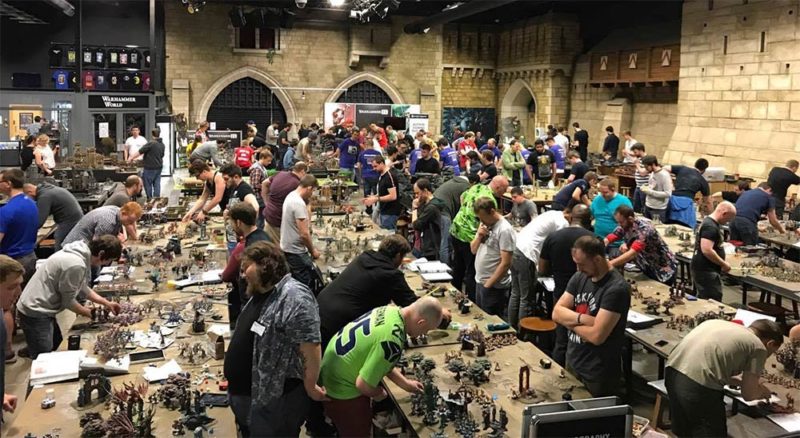
Hi folks! Rhys here with something a little bit different. Instead of my usual discussions of tactics and high-level play, I’d like to talk about competitive 40k in general.
As many of you will know, the host of the Chapter Tactics podcast, Pablo, has been asking listeners to write in to express what competitive 40k means to them in order to win a painted character model.
If readers will indulge me, I’d like to riff on this prompt this week, as well as briefly discussing how we could define competitive 40k, what it is and what it isn’t.
So what does competitive 40k mean to me? I’m going to have to begin with a confession: I’ve never played in a 40k tournament.
Does this mean that I’ve not actually played competitive 40k? Well, maybe, but let’s put that to one side for a moment. I’ll put it this way: when I play 40k, I play to win, and I play with people who are playing to win. We bring strong lists. We shift with the meta. We expect the best from one another.
This, I think, is a pretty good definition of competitive 40k. There’s definitely a distinction between what I play and beer-n-pretzels 40k. Don’t get me wrong: beer-n-pretzels 40k is a great way to play the game. And there is loads of great content out there that covers the non-competitive side of things. But, generally speaking, it’s not how I like to enjoy the game.
This isn’t to say that there are only two ways to play 40k. There are plenty of different ways to throw down in the 41st millennium. But I think that it is fair to say that there is a distinct difference between the 40k that I play and top-level tournament 40k.
For one, players are expected to play two or three games in a day at the big tournaments. This is a totally different beast than playing one game at your local gaming store. Playing 40k on the clock can be tough. But also consider that playing just one game is really tiring. Playing three games, back-to-back, would be downright exhausting. Then you’ve got to do it all again the following day.
While I’m on the topic, a few weeks back, the Chapter Tactics podcast covered how eating properly and maintaining a healthy lifestyle can improve your game at tournaments. It’s a great listen. I’d recommend it. Tldr: your mum was right. Eat your greens.
So, it’s different. Like I said, there are plenty of ways to play. But I’d say that what I do is somewhere in the ballpark of competitive 40k.
And what does competitive 40k mean to me? Like anything worth thinking about, it’s complicated. But it’s worth starting with something simple. 40k is a deep, rich, complex game, and high-level play is the distillation of the wisdom of crowds. Through ongoing trial and error, thousands of 40k players across the globe create an example of what the great 20th century economist FA Hayek described as spontaneous order: through no central direction or planning, we find the best lists, the best combinations of units, the best tactics, the best strategies. These things simply rise to the top as we play.
Indeed, there will be a handful of players who set out to find the best, most competitive list, and they’ll probably get pretty close. But then another group of players will come along and make a couple of changes here and there in order to make it better still. Then the game will change a little, the release of a new codex or a new supplement, for example, and players will yet again find what is currently working best.
This will all happen spontaneously, and the results will be pretty good most of the time. Will the results be perfect? Certainly not. Is there always a list that is the best at any one time? I’d argue that there isn’t. But these things come out in the wash. The community will find what works.
It’s a pretty great thing, I think. Games Workshop no doubt playtest their games as much as is possible in order to keep quality high and competition fierce, but the real playtesting, the place where the rubber meets the road, is out here in the community. As I said, 40k is deep, rich, and complex, and all the different combinations of armies and units aren’t fully explored until the community gets its hands on the game. And that’s a pretty great thing.
What else? To me, competitive 40k represents discipline and challenge. The latter point here is obvious: to play competitive 40k is to challenge oneself against opponents who know what they’re doing. And you either win or you learn. That’s valuable in and of itself.
But the first point goes somewhere a little different. There are a number of ways to apply discipline in our pursuit of the hobby, and competitive gaming in particular.
I’m pretty good at getting models painted before I play with them, but this wasn’t always the case. I’ve had to learn to discipline myself to sit down at my painting table and get to painting. It’s a mistake to wait for inspiration to do something. Improvement comes from disciplined practice. Even if you’re not happy with what you’ve done, just keep going. There’s a pretty good mantra for people who struggle with this: just put paint on it.
And of course, tournaments have painting standards. While I’ve not played in one yet, I plan to next year, and I want my army to be reasonably well painted when I do. This is a pretty good motivator to be disciplined and get it done.
It’s been a great year for the game in general, a great year for competitive 40k, and a great year for Frontline Gaming and the ITC. If this community continues the way we’re going, I think we’re going to be on to something big. E-sports big? Maybe. There’s only one way to find out.
See you on the battlefield in 2020!
And remember, Frontline Gaming sells gaming products at a discount, every day in their webcart!

